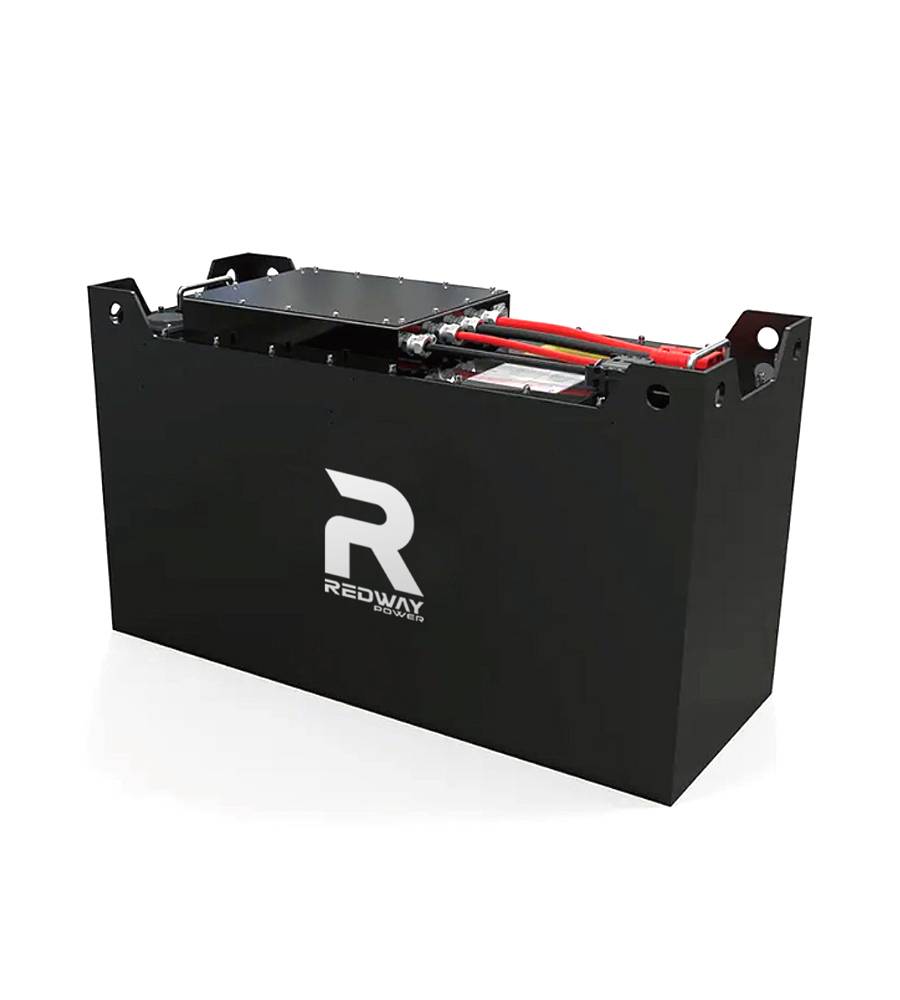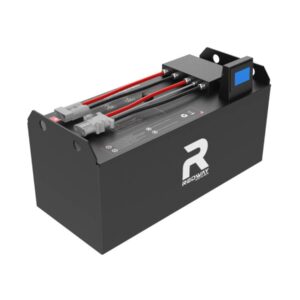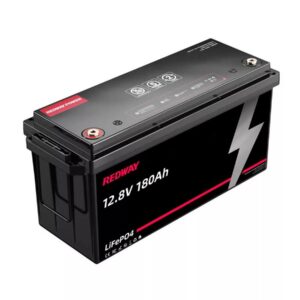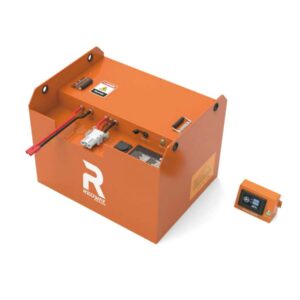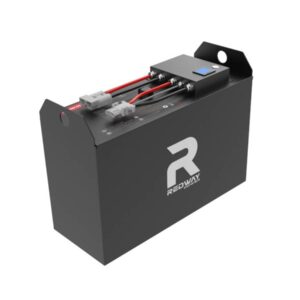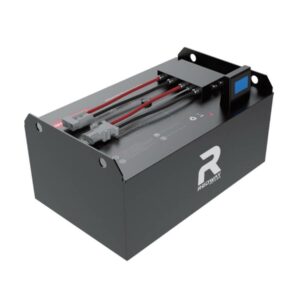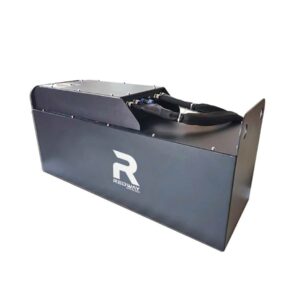Description
Introducing the 72V 300Ah LiFePO4 Forklift Battery, a powerful and efficient energy solution designed for demanding industrial applications. Manufactured by a leading China manufacturer specializing in OEM and ODM services, this advanced lithium iron phosphate (LiFePO4) battery delivers exceptional performance, reliability, and longevity, making it ideal for wholesale buyers looking to enhance their forklift operations.
Key Features
- High Energy Capacity: Provides a nominal capacity of 300Ah and an energy output of 21.6 kWh, ensuring consistent power for heavy-duty applications.
- Long Cycle Life: Engineered to last over 2,000 cycles at 80% Depth of Discharge (DoD), significantly reducing replacement costs and downtime.
- Robust Performance: Supports a maximum charge current of 50A and a peak discharge current of 300A, making it suitable for high-demand operational requirements.
- Advanced Safety Features: Equipped with a smart Battery Management System (BMS) that monitors critical parameters and protects against overcharging, overheating, and short circuits.
- Durable Construction: Rated IP65 for dust and water resistance, this battery is built to withstand harsh working environments.
Product Description
The 72V 300Ah LiFePO4 Forklift Battery is specifically designed to provide reliable power for electric forklifts in various industrial settings. Operating at a nominal voltage of 72V, this lithium iron phosphate battery offers a substantial capacity of 300Ah, translating to an impressive energy output of 21.6 kWh. This ensures your forklift can operate efficiently for extended periods without frequent recharging.
- Key Specifications:
- Nominal Voltage: 72V
- Energy Output: 21.6 kWh
- Dimensions: Approximately 1097 mm x 570 mm x 260 mm
- Weight: Approximately 120 kg
- Operating Temperature Range: Charging at 0°C to 45°C; Discharging from -20°C to 60°C
This battery operates efficiently within an impressive voltage range of 60V–87.6V, ensuring optimal performance across different applications. The natural cooling system maintains operational temperatures while the advanced BMS continuously monitors State of Charge (SOC), voltage, current, and temperature.
- With a warranty of five years, this lithium battery offers peace of mind alongside its superior performance. The integrated communication options (RS485, CAN-bus, and 4G) enable seamless monitoring and management of battery status, allowing for effective fleet management.
Choose the 72V 300Ah LiFePO4 Forklift Battery for a sustainable power solution that enhances operational efficiency while minimizing total cost of ownership. As an OEM/ODM supplier, we offer customization options to meet your specific requirements. Whether you need tailored specifications or branding solutions, our team is ready to assist you in creating the perfect battery solution for your business needs.
Why Choose Us?
As a reputable manufacturer in China, we pride ourselves on our commitment to quality and customer satisfaction. Our factory utilizes advanced technology and rigorous quality control measures to ensure that every battery meets the highest standards. By choosing us as your supplier, you can expect:
- Competitive pricing tailored for B2B partnerships.
- Reliable delivery schedules to keep your operations running smoothly.
- Comprehensive support throughout the purchasing process, from inquiry to after-sales service.
Join numerous satisfied customers who have chosen our products for their energy needs. Experience the advantages of working with a trusted Chinese manufacturer that prioritizes innovation, quality, and customer relationships. Contact us today to learn more about our products and how we can support your business!
72V 300Ah LiFePO4 Battery Specs
What is the capacity of 72V 300Ah LiFePO4 battery?
A 72V 300Ah LiFePO4 battery has a total energy capacity of 21.6 kWh. It offers high efficiency, extended cycle life, and consistent power output, making it ideal for heavy-duty forklift operations. The battery’s high energy density ensures longer operational hours and reduces downtime.
Why choose LiFePO4 chemistry for forklift batteries?
LiFePO4 chemistry is safer, has a longer lifespan (up to 5,000 cycles), and offers better thermal stability than lead-acid and traditional lithium-ion batteries. It reduces the risk of thermal runaway, enhances performance, and requires less maintenance, making it ideal for forklifts.
How does 72V 300Ah LiFePO4 improve forklift performance?
A 72V 300Ah LiFePO4 battery improves forklift performance by delivering consistent power, allowing for longer operational hours and faster charging times. It reduces downtime, increases energy efficiency, and eliminates the performance degradation commonly seen in lead-acid batteries.
What safety features do LiFePO4 forklift batteries offer?
LiFePO4 forklift batteries feature multiple safety protections, including overcharge, over-discharge, short circuit, and thermal management systems. Their stable chemistry and built-in Battery Management System (BMS) minimize fire risks, ensuring safe operation in industrial environments.
How long does a 72V 300Ah LiFePO4 battery last?
A 72V 300Ah LiFePO4 battery can last 8–10 years, with a lifespan of 3,000 to 5,000 cycles. Proper maintenance, such as avoiding deep discharge and following optimal charging practices, helps maximize its longevity in forklift applications.
What maintenance is required for LiFePO4 forklift batteries?
LiFePO4 forklift batteries require minimal maintenance. Regular inspections to ensure terminal cleanliness, proper charging, and avoiding prolonged deep discharge help optimize battery lifespan. Monitoring the Battery Management System (BMS) also ensures consistent performance.
China OEM Lithium Forklift Leadership
What defines high-capacity lithium forklift batteries?
High-capacity lithium forklift batteries, such as 72V 300Ah models, offer higher energy density, faster charging, and longer lifespans compared to traditional lead-acid batteries. They support heavy-duty applications and improve operational efficiency in demanding industrial environments.
How do Chinese OEMs lead lithium battery production?
Chinese OEMs lead lithium battery production through large-scale manufacturing, cost-efficiency, and advanced technology. Companies like CATL and BYD dominate the market with high-quality lithium batteries that meet international safety and performance standards.
What are key advantages of lithium forklift batteries?
Lithium forklift batteries offer faster charging, longer lifespan, higher energy efficiency, and reduced maintenance. They outperform lead-acid batteries by maintaining consistent power output and minimizing downtime, enhancing overall operational efficiency.
How does OEM customization impact battery performance?
OEM customization optimizes battery performance by tailoring specifications to meet forklift model requirements. This includes adjusting voltage, capacity, and thermal management systems to improve efficiency and extend battery lifespan in industrial applications.
What safety standards govern lithium forklift batteries?
Lithium forklift batteries must comply with international safety standards such as UL1642, CE, and UN38.3. These certifications ensure protection against overcharging, short circuits, and thermal runaway, ensuring operational safety.
How do Chinese OEMs ensure global supply reliability?
Chinese OEMs ensure global supply reliability by maintaining large-scale production capabilities, implementing rigorous quality control processes, and meeting international safety standards. They also offer flexible logistics solutions to meet global demand efficiently.
Top LiFePO4 Manufacturers in China
What are top LiFePO4 forklift battery manufacturers in China?
Top LiFePO4 forklift battery manufacturers in China include CATL, BYD, Gotion High-Tech, and EVE Energy. These companies provide high-quality batteries that meet global safety standards and cater to various industrial applications.
How does LiFePO4 technology benefit forklift batteries?
LiFePO4 technology benefits forklift batteries by offering longer lifespans, higher thermal stability, and faster charging. It reduces maintenance costs and ensures consistent power output, enhancing operational efficiency and reliability in industrial applications.
What certifications do Chinese LiFePO4 battery manufacturers hold?
Chinese LiFePO4 battery manufacturers hold certifications such as UL1642, CE, ISO9001, and UN38.3. These certifications verify compliance with global safety, environmental, and quality standards, ensuring reliability and safety in industrial applications.
How do Chinese manufacturers ensure LiFePO4 battery longevity?
Chinese manufacturers ensure LiFePO4 battery longevity through advanced Battery Management Systems (BMS), strict quality control, and adherence to international safety standards. Proper thermal management and optimized charging protocols further enhance lifespan.
What is the market share of Chinese LiFePO4 forklift batteries?
Chinese manufacturers dominate the LiFePO4 forklift battery market, accounting for over 60% of global supply. Their competitive pricing, large-scale production, and technological advancements contribute to their significant market share.
How do Chinese suppliers handle LiFePO4 battery recycling?
Chinese suppliers prioritize environmentally friendly battery recycling by implementing strict collection processes and ensuring compliance with global recycling regulations. Many manufacturers have established recycling facilities to reduce environmental impact.
Global 300Ah LiFePO4 Suppliers
Who are top 300Ah LiFePO4 battery suppliers globally?
Top global 300Ah LiFePO4 battery suppliers include CATL, BYD, LG Chem, Panasonic, and EVE Energy. These companies supply reliable, high-capacity batteries for industrial applications, including forklifts and electric vehicles.
Where are major 300Ah LiFePO4 battery manufacturers located?
Major 300Ah LiFePO4 battery manufacturers are located in China, South Korea, Japan, and the United States. China leads in production capacity, followed by South Korea and Japan, which focus on high-performance battery technologies.
What certifications do 300Ah LiFePO4 battery suppliers have?
Global 300Ah LiFePO4 battery suppliers hold certifications such as UL, CE, RoHS, and UN38.3. These certifications ensure compliance with safety, quality, and environmental standards in international markets.
How do suppliers ensure 300Ah LiFePO4 battery reliability?
Suppliers ensure 300Ah LiFePO4 battery reliability by implementing advanced Battery Management Systems (BMS), strict quality control processes, and adhering to global safety standards. Thermal management and regular testing further improve battery durability.
What pricing trends affect 300Ah LiFePO4 battery suppliers?
Pricing trends for 300Ah LiFePO4 batteries are influenced by raw material costs, global demand, and technological advancements. Prices have been declining due to increased production capacity and competition among manufacturers.
Which industries primarily use 300Ah LiFePO4 battery suppliers?
Industries such as warehousing, logistics, manufacturing, and material handling primarily use 300Ah LiFePO4 batteries. These batteries power forklifts, electric vehicles, and industrial equipment, enhancing productivity and reducing operational costs.
Forklift Battery Maintenance & Trends
Benefits of lithium batteries in forklifts?
Lithium batteries offer longer lifespan, faster charging, higher energy efficiency, and reduced maintenance compared to lead-acid batteries. They provide consistent power output, minimizing downtime and enhancing overall forklift performance.
Factors affecting lithium battery lifespan?
Factors affecting lithium battery lifespan include proper charging cycles, thermal management, depth of discharge, and avoiding overcharging. Regular maintenance and monitoring through a Battery Management System (BMS) can optimize battery life.
Safety standards for industrial forklift batteries?
Industrial forklift batteries must comply with safety standards such as UL1642, CE, and UN38.3. These standards ensure protection against overcharging, short circuits, and thermal runaway, enhancing safety in industrial environments.
Maintenance practices for lithium forklift batteries?
Maintenance practices for lithium forklift batteries include regular charging, keeping terminals clean, and monitoring the Battery Management System (BMS). Avoiding deep discharges and overcharging also helps extend battery lifespan.
Cost comparison: lithium vs. lead-acid batteries?
Lithium batteries have a higher initial cost but lower long-term operating costs compared to lead-acid batteries. They offer longer lifespans, faster charging, and reduced maintenance, resulting in lower total cost of ownership over time.
Future trends in forklift battery technology?
Future trends in forklift battery technology include advancements in fast charging, improved thermal management, higher energy density, and increased adoption of solid-state batteries. These innovations will enhance efficiency and safety in industrial operations.
72V LiFePO4 Warehouse Applications
What are key advantages of 72V LiFePO4 batteries?
72V LiFePO4 batteries offer higher voltage output, longer lifespan, faster charging, and better thermal stability. They are ideal for heavy-duty warehouse applications, reducing downtime and operational costs.
How to design thermal management for 72V LiFePO4 systems?
Designing thermal management for 72V LiFePO4 systems involves using active cooling systems, heat sinks, and temperature monitoring sensors. These features prevent overheating and ensure optimal performance during high-demand operations.
What safety standards apply to warehouse LiFePO4 batteries?
Warehouse LiFePO4 batteries must comply with safety standards such as UL1642, CE, and UN38.3. These standards ensure protection against thermal runaway, overcharging, and short circuits, ensuring safe operation in warehouse environments.
How does 72V LiFePO4 compare to lead-acid in cost-efficiency?
72V LiFePO4 batteries are more cost-efficient than lead-acid batteries due to their longer lifespan, faster charging, and reduced maintenance requirements. Over time, they offer lower total cost of ownership despite higher initial costs.
What maintenance protocols optimize LiFePO4 battery lifespan?
Maintenance protocols for LiFePO4 batteries include regular charging, avoiding deep discharges, keeping terminals clean, and monitoring the Battery Management System (BMS). Proper storage in cool, dry environments also extends battery lifespan.
Which warehouse equipment benefits most from 72V LiFePO4?
Warehouse equipment such as forklifts, pallet jacks, automated guided vehicles (AGVs), and electric tow tractors benefit most from 72V LiFePO4 batteries. These batteries enhance operational efficiency and reduce downtime in high-demand environments.

